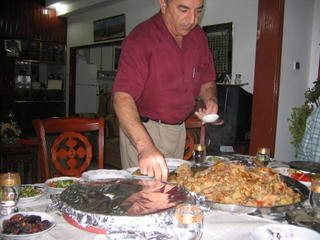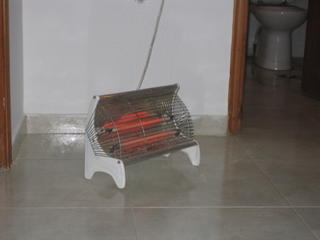Abu Soufian

Last night, Abu Soufian invited me to iftar. I see him most evenings, when I am visiting with Abu Imad in his small grocery. At the end of the daily Ramadan fast, Abu Soufian arrives beleaguered at Abu Imad’s store, his white apron and blue jumpsuit smudged with pancake batter, and orders three pita sandwiches and five bottles of grape juice. He and his sons eat them to break the fast, as they are closing their shop. They spend the day churning out pancakes, which are called qatief, a traditional Ramadan desert.
Abu Soufian, whose family came to Ramallah from Hebron during the British mandate, lives in an old house across from Abu Imad’s grocery in the predominantly Christian Old City. His extended family gathers each night for Ramadan. I sat in one room with Abu Soufian and two of his sons, and the women sat in another room. One of his daughters served us. We ate maqlouba (rice, cauliflower, eggplant) with tender chunks of lamb – Abu Soufian instructed me to eat with my hands – with yogurt and vegetable noodle soup. We drank carob juice, a traditional Ramadan drink in Palestine, sold in recycled plastic two-liter plastic Pepsi bottles at stands all over town. Then, the women joined us and we drank Arabic coffee without sugar, then Arabic coffee with sugar. Then, the qatief. For 40 years, Abu Soufian has been making qatief in the same small shop, open only during the month of Ramadan. (During the rest of the year, he operates a restaurant in nearby Beitouniya.) He calls himself the king of qatief. I was anxious to try it.
His daughter prepared three varieties of qatief. The pancakes were folded in half, some filled with sweet cheese, some with walnuts (from California) and some with cream. The outside was sticky and sweet. I ate two of each. We talked politics – every conversation here turns to politics – and languages and American culture: Americans’ love for big cars that consume a lot of gasoline and the completely foreign concept of Americans leaving home when they are 18 to live on their own. When I told Abu Soufian that American women also leave home when they are 18, he responded: “haram!” which means forbidden by Islam. His son invited me to his engagement party, next month, and gave me a ride home.










